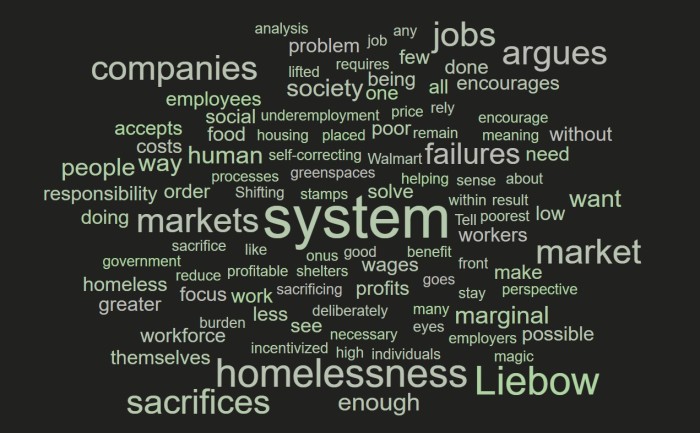In Tell Them Who I Am Elliot Liebow writes, “Unemployment, underemployment, and substandard wages are system failures only when viewed from the bottom. Looking from the top down, they are seen as natural processes essential to the healthy functioning of a self-correcting market system. From that perspective, it is as if the market system requires human sacrifice for its good health.” Liebow argues that markets can and should function without such failures. He argues that we have deliberately crafted a system that allows and accepts these market failures at the expense of greater marginal profits and returns on investments. The costs of the failures become spread over society, while the marginal gains are concentrated in the few market leaders.
Liebow encourages us to see homelessness as a system failure. He encourages us to see the support of the homeless as a responsibility of everyone within society and as a responsibility of the system as a whole. His book argues that we cannot rely on the few shelters, the minimal government assistance, and family members of those in need if we want to reduce homelessness. We all have to recognize the costs of homelessness, the way that social and market forces can drive people to homelessness, and the actors who are not helping to solve the problem. In particular, Liebow argues that businesses are not doing enough to solve homelessness:
“As if by magic, the onus of welfare and dependency is lifted from the system of work and the employers and placed on the workers and the unemployed right in front of our very eyes, and no one is any the wiser.”
I don’t think markets need to operate in a way that sacrifices the poorest people. There are statistics about the numbers of employees at companies like Walmart who receive food stamps or Medicaid benefits. Companies are able to pay minimum wage to their employees, and Liebow argues the companies themselves are subsidized for their low wages by our system that provides free healthcare and food to those individuals who cannot earn enough through their job. This shifts the burden of supporting the workforce from the companies that require the workforce in order to be profitable to the workers themselves. This accepts that we will have human sacrifices in order for profits to stay high and for the price of cheap goods to remain low. Liebow thought this was a problem and believed that it was possible for effective markets to exist without such human sacrifices.
I would also argue that there are many jobs that are not being done because we focus so highly on private markets. Companies want to be as efficient as possible, meaning they focus on where they can generate the highest profit. As a result, we don’t build enough affordable housing, our parks and greenspaces are littered with trash that no one is incentivized to clean, and lots of recycling goes to landfills instead of being sorted and reused. These are not all wonderful jobs and it would be hard to get homeless people to do these types of jobs, but the point is that our system which sacrifices the poor also sacrifices those jobs that don’t make the marginal cost benefit analysis worthwhile for corporations. There is work that can be done if we can find a way to allow public institutions to do it. Shifting from a sense of sacrificing the poor may encourage them to actually participate in society by doing these jobs, especially if we can make them suck a little less. Such a system would be a big departure from our current approach to markets, but it is probably necessary if we want greater social cohesion and less poverty and homelessness.
